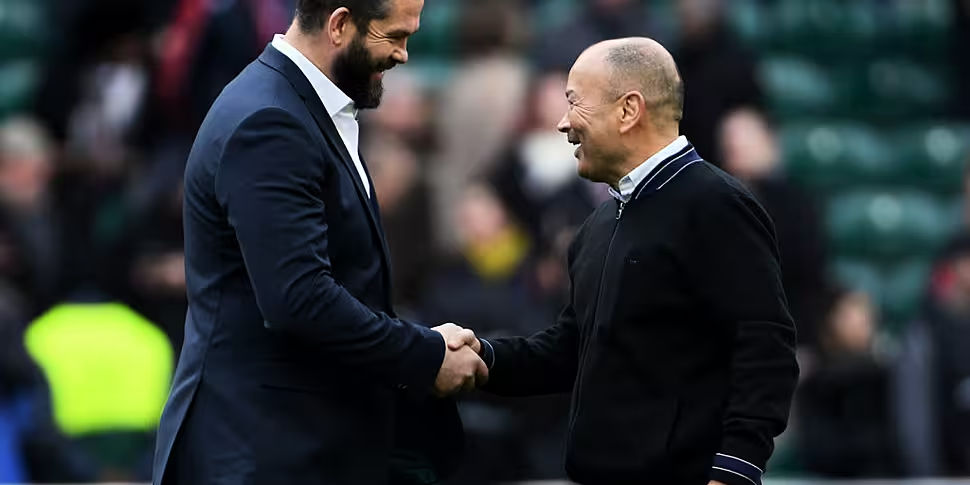Head coach Eddie Jones says that the opening half performance by his England team in their Six Nations win against Ireland gave him a lot of satisfaction.
Ireland were considered lucky by many to be trailing 17-0 going into the dressing rooms at half-time, in the game at Twickenham which they eventually lost 24-12.
Jones was speaking this week on the official England Rugby podcast and host Ugo Monye asked him what gives him the most satisfaction from coaching.
"Firstly, when your team plays really well, it gives you a lot of satisfaction" says Jones, who signed an extension with the RFU today.
"I look back at the England side when we played the first forty minutes against Ireland and we really put them to the sword.
"And that comes down [to] the preparation that the team had, so that gives you some enjoyment.
"The second part, which is probably the more enduring part of coaching, is the satisfaction you get from improving players and seeing players blossom.
"Guys that maybe doubted themselves or thought that they couldn't make it and they come on to the big stage and consistently perform."
Jones points to England props Kyle Sinckler and prop Ellis Genge as examples of that.
"We took those both of those guys on tour in 2016 to Australia, they were pretty rough diamonds.
"They're a bit shinier now but not the full eighteen carat!"
Jones was asked about who has influenced him most as a coach and he cites two fellow Australians from different codes.
The first is the 1991 Rugby World Cup winning coach with Australia, Bob Dwyer, who became mentor to Jones after coaching him for years at Randwick Rugby Club.
"He was way ahead of his time. He was a progressive guy. Even back then in the early eighties and nineties, he was using sport science," says Jones.
"We used to have what they called metabolic sessions where we'd practice our own skill for forty-five seconds at full pace, which was unheard of in those days when you used to just run, team runs.
"He could remember every bit of a game. It always quite irks me now when I ask coaches what they saw in a game and they say, 'we have to watch the video'.
"He would be able to watch a game and be able to remember everything you did in a game.
"It's one of the key skills for coaches to develop and they certainly have a great opportunity to do it now. Watch games, observe games, see what you see and make notes from it.
"You can train your mind to be more active in observing a game, not being a fan of the game.
"He was absolutely outstanding in that sense so if I picked up one tenth of how good he was, I would be very lucky."
Jones also points to the former Australia cricket captain Ian Chappell, a choice which gives some insight into Jones' own approach to coaching.
"Australia had a very weak team and they were getting beaten two-nil in the Ashes and he came and captained the side in the last Test and just was this abrasive, not so caring about tradition-type guy," explained Jones.
"He changed the Australian cricket team from being a laughing stock to being the best team in the world.
"It always sticks in mind that to be a leader, you've got to be able to back your own way of doing it and have the courage to do it because you're always going to have people out there that say it's the wrong way to do it because you can't please everyone."
With the Six Nations stalled due to the coronavirus pandemic, Jones has been looking back at the games played in the tournament so far as well as Super League and NRL matches.
He has some good advice for any budding rugby players or coaches who are currently looking for things to keep themselves occupied while staying indoors.
"I think you set targets. Some personal targets, some professional targets. Be very specific about what you want to improve and how you can improve it and stick to those targets," says Jones.
"Give yourself goals to achieve on a personal level and professional level.
"That's something I've regularly done throughout my career to keep myself motivated, keep myself focused on keeping improving.
"Reach out to those players you think might need a bit of a hand to stay motivated and stay focused.
"If you've got young kids, invent games for them to play with balls. Invent games for them to play with tennis balls.
"If they don't have a backyard, invent a game they can play in their lounge room with their mother or their father.
"There's ways to stay focused but look to see how you can get better and treat every day like day one.
"Every day you get up say, 'Right how can I get better today, what can I do to get better. How can I improve'.
"There's so much information out there now.
"There was a guy today that text me and said he was watching old videos from the 1980s of rugby and he was commenting how skillful the players were.
"The big difference between the 1980s and now is the strength of the defence and the physical capacity of the players so how can we make the players more skillful?
"If you're a coach out there, think about how you can make the players more skillful, how you can make them do more skill work, because if you prioritise anything in your life you'll get good at it."









